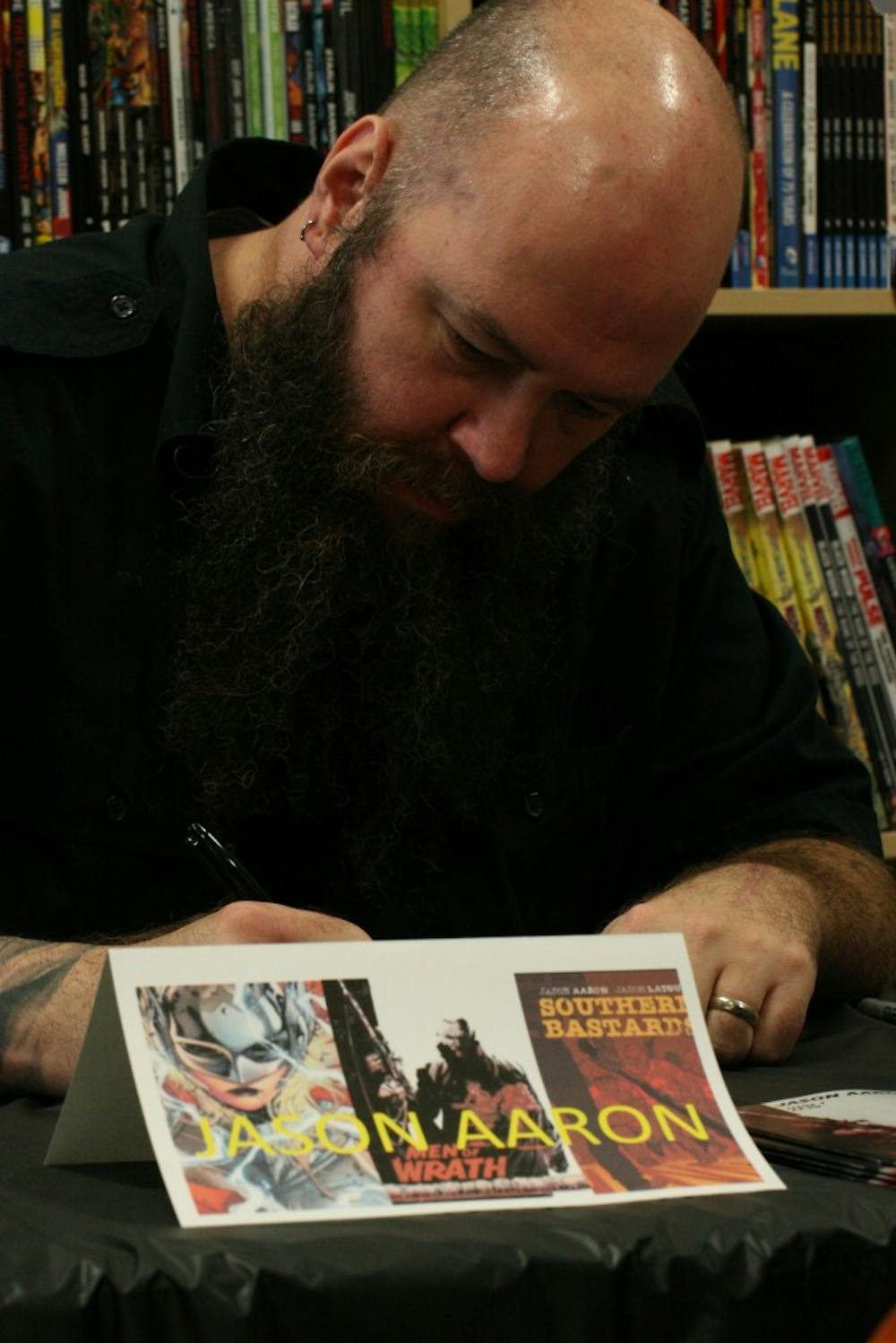Author of Marvel’s first female Thor, Jason Aaron made a stop in Muncie on Oct. 4 to sign fans’ books at Alter Ego Comics.
Over his nine-year career with Marvel, Aaron has written stories for comic book standards such as X-men, Wolverine and Thor. This current iteration of the Norse God of thunder continues his two years working with the superhero. He passed up on two unnamed projects to continue working on Thor.
Q: Why make Thor female?
A: It was just the story I wanted to tell. Everything I do working for Marvel is writing characters who have been in continuous publication for 60 years. So, it’s all about what came before, but also trying to tell new stories and take it new places it hasn’t been before.
We have seen a lot of characters over those 600-plus issues with that hammer. Very rarely have those characters been female. And if you look at the supporting cast that’s built up around Thor, most of those supporting characters are female. So, when I knew I wanted to get Thor to the point where he couldn’t pick up his hammer and open the door for somebody else to come along, it seemed natural to have that be a lady.
Of course, that change wasn’t made for the sake of making it; we still had to know who was that person that was going to pick up that hammer, what was her story? That’s the thing I am most excited about. Everything we are doing involving the change and the mystery of it is more the set-up for her actual story. Her actual story begins when we find out who is beneath the mask.
Q: Was this a longer project you were planning?
A: I’ve been writing Thor for two years and I laid a lot of tracks for long-term stories. It should be obvious I am not going anywhere anytime soon. You can tell from the first issue, I’m not giving you all the answers right away. It’s the first part of a long story.
Q: How are old Thor and the new Thor going to relate?
A: It’s not like Batman and Robin. Issue one has a lot about the previous version of Thor. He goes away for a few issues and you get some [issues] that focus solely on her. Then in issue four, they come face-to-face for the first time. And as you expect, the previous Thor has some questions.
"Who are you and why do you have my hammer?" Going forward from there, they’ll be a part of the book. But, they won’t be teaming up or palling around. They’ll have their own stories and character arcs.
Q: Was it hard to pitch this story?
A: There was never any pushback.
Q: How far do you plan ahead and how deep?
A: With Thor, I have a big notebook full of ideas, and I know the direction and where everything is going with her and Thor, Odin’s son. I’ve got a few years’ worth of stories, and I know how my run on Thor will eventually end and what those last few stories are. As to what fills in there in between, I don’t know exactly.
Q: What is special about Thor that makes you want to stick with it?
A: There are stories you can do on Thor that you can’t do on Captain America or Spiderman or Wolverine or any other character in Marvel. When Stan Lee and Jack Kirby first created the Marvel version of Thor, it was about how this character is different because of the fact he is the God of thunder. He is a Norse God, and that sets him apart from the other characters.
Q: From where did the inspiration for the new Thor’s costume design come?
A: We just wanted her to look like Thor, not Thor’s back-up dancer or a Robin or somebody else’s Batman.
Q: What are themes you can’t really cover with anyone else?
A: I really don’t sit down with writing and think, “What is the theme of the story?” or “What does this symbolize?” That kind of stuff just comes as icing on the cake.
But, I think you can look at a lot of stuff I have done and see, with this being a story about Gods, there are a lot of issues with religion and atheism.
Q: Any restrictions on what you can do at Marvel?
A: Of course you are restricted because you have to be aware that they are bigger than you as a writer or creator. These characters are older than me and will be here when I am gone.
When I was writing Wolverine, I had to be aware that my son, who was down the hall from me, was a toddler at the time. He had Wolverine toys in his bedroom. These characters have such a wide footprint.
That said, you don’t have to put them on pedestals. You can take them down and twist them around a little bit.
Q: As a father, what’s that like having a son who plays with Marvel toys and probably worships those characters, like any young boy, and then seeing his father make the next iteration?
A: I think it may be weird for him at times, but at the end of the day I am still his dad. I’m the guy who tells him, “You need to take a bath,” and, “You need to clean your room.”
I think he thinks it’s pretty cool I get to write comics for a living.
You also have to accept that, at one point, no matter what you do or who you are, your kids won’t think you are cool anymore. Your friends might still be cool, but you're their parents. So you aren’t going to be cool.
Q: How did you get to the point you are now with being able to take complete creative control and say, “I got this.”
A: Part of it is you have to build the trust of Marvel. Marvel is the caretaker of these characters; I’m just the guy who comes in and plays with the toys and puts them back on the shelf and leaves.
I wrote lots of Wolverine and X-Men. I am confident enough that I’m not going to be fired tomorrow.
Q: As a writer, what are some of your favorite stories to tell? What do you like to play around with in writing?
A: It just depends. If you look at all the stuff I’ve done at Marvel, I have covered different genres and different kinds of characters. I have done a lot of dark and gritty stuff, but also stuff that is light-hearted and silly.
I read all of kinds of stuff. I get bored reading the same thing over and over again, and I get bored writing the same thing over and over again.
Q: What have been influences on your writing in terms of authors and book series?
A: In terms of comics, Grant Morrison has always been my favorite comic book writer. He’s the guy who has done some pretty vital things in the mainstream and worked with some huge superheroes. They have been some of the most innovative comics in the past few decades.
I’m a southerner, so I consider myself a southern writer. So [William] Faulkner was a big influence. I’m [also] a big crime fiction fan, so Elmore Leonard and James Ellroy.
[And] I think Cormac McCarthy is the greatest living writer in the world.
Q: How did you get into it?
A: It took until I was in my late 20s when I won a Marvel Talent Search contest, which didn’t really lead to anything else other than to give me courage for the first time to say, “I’ll take a shot at this.”
I started pitching a lot of stuff and one thing led to another.
Q: Any advice for new writers?
A: Write every day is the easy thing.
If you want to write comics, tell your own stories. Nobody breaks into comics by doing Batman or Spiderman. Write stories where you feel you are the only one who can tell that story.
But, it starts with you showing what stories you can tell.
Q: How important do you think this is for feminism in comics? Is that why this received so much attention (because it did get on "The View")? Is that what people focused on?
A: Well, it certainly became a mainstream story, and it was one of the things people focused on, either people who raging against this story or people who support it.
For me, it’s just the aftereffect of the story. Yes, I am for us doing more books with female characters, just like how I’d love to see more female readers and writers doing those books. It’s not like I set out to make this change for the sake of making the change without having the story. If I was doing it for the sake of doing it, the story would be very hollow.
Q: What would you say to someone new to comics or has never read Thor before?
A: Hopefully, everything you need to know story wise is within the first issue.
Even if you have just seen the movies, I think you see enough you recognize from the screen that you’ll see here, but this is about being ahead of the movies.
It’s not just following and reflecting exactly what they are doing in the movies, but telling the stories in the comics that they’ll want to make a movie out of 10 or 20 years from now.





